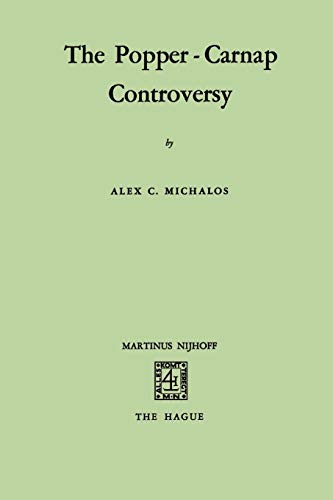Items related to The Popper-Carnap Controversy

"synopsis" may belong to another edition of this title.
- PublisherSpringer
- Publication date1971
- ISBN 10 9024751276
- ISBN 13 9789024751273
- BindingPaperback
- Number of pages135
Buy New
Learn more about this copy
Shipping:
£ 3.21
Within U.S.A.
Top Search Results from the AbeBooks Marketplace
The Popper-Carnap Controversy
Book Description Paperback. Condition: new. New. Fast Shipping and good customer service. Seller Inventory # Holz_New_9024751276
The Popper-Carnap Controversy
Book Description Condition: new. Seller Inventory # FrontCover9024751276
The Popper-Carnap Controversy
Book Description Paperback. Condition: new. New Copy. Customer Service Guaranteed. Seller Inventory # think9024751276
The Popper-Carnap Controversy [Soft Cover ]
Book Description Soft Cover. Condition: new. Seller Inventory # 9789024751273
The Popper-Carnap Controversy
Book Description Condition: New. Seller Inventory # ABLIING23Apr0316110330447
The Popper-Carnap Controversy
Book Description Condition: New. PRINT ON DEMAND Book; New; Fast Shipping from the UK. No. book. Seller Inventory # ria9789024751273_lsuk
THE POPPER-CARNAP CONTROVERSY
Book Description Condition: New. New. In shrink wrap. Looks like an interesting title! 0.45. Seller Inventory # SL-9024751276
The Popper-Carnap Controversy
Book Description Taschenbuch. Condition: Neu. Druck auf Anfrage Neuware - Printed after ordering - 1 In 1954 Karl Popper published an article attempting to show that the identification of the quantitative concept degree of confirmation with the quantitative concept degree of probability is a serious error. The error was presumably committed by J. M. Keynes, H. Reichen bach and R. Carnap. 2 It was Popper's intention then, to expose the error and to introduce an explicatum for the prescientific concept of degree of confirmation. A few months later Y. Bar-Hillel published an article attempting to show that no serious error had been committed (particularly by Carnap) and that the problem introduced by Popper was simply a 'verbal one. '3 Popper replied immediately that 'Dr. Bar-Hillel forces me [Popper] now to criticize Carnap's theory further,' and he [Popper] introduced further objections which, if accepted, destroy Carnap's theory. 4 About eight years after this exchange took place I was in graduate school at the University of Chicago in search of a topic for a doctoral dissertation. An investigation of the issues involved in this exchange seemed to be ideal for me because I had (and still have) a great ad miration for the work of both Carnap and Popper. A thoroughly revised and I hope improved account of that investigation appears in the first five chapters of this book. Put very briefly, what I found were four main points of contention. Seller Inventory # 9789024751273
The Popper-Carnap Controversy
Book Description Kartoniert / Broschiert. Condition: New. Dieser Artikel ist ein Print on Demand Artikel und wird nach Ihrer Bestellung fuer Sie gedruckt. 1 In 1954 Karl Popper published an article attempting to show that the identification of the quantitative concept degree of confirmation with the quantitative concept degree of probability is a serious error. The error was presumably committed by J. M. Keyn. Seller Inventory # 5813882
The Popper-Carnap Controversy
Book Description PF. Condition: New. Seller Inventory # 6666-IUK-9789024751273

